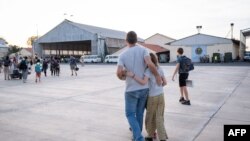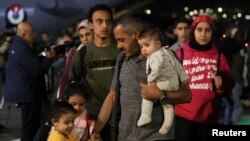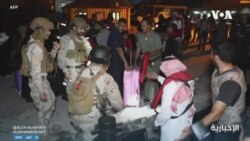Countries are rushing to evacuate their diplomats and citizens from Khartoum, Sudan’s capital, as fighting between the two rival factions in the Northeastern African country continues.
Canada, Egypt, France, Germany, Italy, Sweden and the United States are among the nations using aircraft and convoys to bring foreign nationals out of Sudan.
More than 420 people have been killed so far, and thousands have been injured.
More than 420 people have been killed so far and thousands have been injured.
SEE ALSO: A related video by VOA’s Veronica Balderas
Sudanese nationals are fending for themselves amid power blackouts and loss of internet service.
Some Sudanese have made the decision to escape in cars and buses on the dangerous roads.
Samantha Power, administrator of the U.S. Agency for International Development, announced Sunday the organization has deployed a team of disaster response experts to Sudan. She said the team will initially operate out of Kenya.
“The United States is mobilizing to ramp up assistance to the people of Sudan ensnared between the warring factions,” Power said.
She said the Disaster Assistance Response Team will work with “the international community and our international partners to identify priority needs and to safely deliver life-saving humanitarian assistance to those who need it most.”
“At a time when many Sudanese families should be celebrating the end of the holy month of Ramadan, they are instead living in terror,” Power said.
Fighting between the warring factions has also erupted in Darfur.
“All of this suffering compounds an already dire situation,” Power said. “One-third of Sudan’s population, nearly 16 million people, already needed humanitarian assistance to meet basic human needs before this outbreak of violence.”
United Nations Secretary-General Antonio Guterres said Monday the U.N. is not leaving Sudan but has temporarily relocated “hundreds” of staff members inside and outside of the country.
“Working with humanitarian organizations on the ground, we are reconfiguring our presence in Sudan to enable us to continue supporting the Sudanese people,” Guterres said at a Security Council meeting. “Let me be clear: The United Nations is not leaving Sudan. Our commitment is to the Sudanese people in support of their wishes for a peaceful and secure future. We stand with them at this terrible time.”
The U.N. has about 800 international staff in the country, and many of them have their families living with them in Khartoum. There are also about 3,200 Sudanese nationals working for the organization.
Guterres said he is in constant contact with the warring parties. He has repeatedly called for de-escalation, an end to the fighting and talks. He urged all Security Council members to “exert maximum leverage” on the rival generals to stop fighting and return to a democratic transition.
“The violence must stop. It risks a catastrophic conflagration within Sudan that could engulf the whole region and beyond,” he warned.
He strongly condemned the indiscriminate bombing of civilian areas and health care facilities.
“I call on the parties to stop combat operations in densely populated areas and to allow unhindered humanitarian aid operations,” Guterres said. “Civilians must be able to access food, water and other essential supplies, and evacuate from combat zones.”
VOA's Margaret Besheer at the United Nations contributed to this report.











